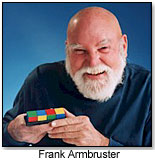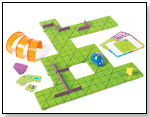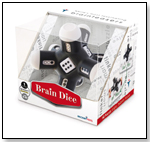|
|
The Mathematics of a Successful Toy How to Tell if You Have a Hit

From 1 to 10, how easy are the rules of a game or puzzle? Example: jigsaw puzzles have easy rules (you don’t even need instructions, just look at the box). Give it a 1 for ease of rules. Now, take a 1000-piece jigsaw puzzle: What is the strategic difficulty of it? One-thousand-piece puzzles can take hours, sometimes days to complete, the pieces are smallish, it can border on frustration. Give it a 7 for strategic difficulty. Now turn these two numbers into a fraction (strategic difficulty/ease of rules), and we get: 7. Jigsaw puzzles have a high overall chance of success (nothing we don’t know already). But there’s more. Add in the fact that jigsaw puzzles are language independent, and jigsaw puzzles rate a 7+. But … … there’s more, more. Armbruster took Skinnerian psychological principles (B. F. Skinner, the father of behaviorism, a branch of psychology) and applied it to games and puzzles. There’s lots of arcane research, behaviorism theory and tons of data, but the conclusion is that the greatest “value in terms of reinforcement versus extinction” occurs as the result of a random schedule of reinforcement — when you do A, then B happens at a random interval (a slot machine paying off, for example). Basically, someone will play a game or work on a puzzle if there’s an unpredictable schedule of outcome. Like chess — no two games are exactly the same. Or, as Armbruster pointed out: “If you pull a handle on a broken soda machine,” which has a continuous reinforcement — do A and B happens every time — and it doesn’t work, a person will stop pulling that handle pretty quickly.“ But on a broken slot machine, a person will continue to pull that handle indefinitely.” A puzzle or game or activity that has a high numeric rating and random reinforcement schedule has an incredible value in terms of how much money people will spend on it. Shall we try a few more real-world examples? How about chess and checkers? Both have been successful for quite a long time (in fact, chess is considered the oldest skill game in the world, and, with modern-day rules, checkers has been around since 1100 A.D.). Both have easily explainable rules. “What? Chess easy?” you cry. Really, all you need to know are the basic moves for each character piece and that’s it. Let’s call it a 3 on the difficulty scale. Checkers is even easier, with “kinging” being the big learning hump. Let’s give checkers a 2. Both have a huge potential for strategic difficulty; chess has aisles of books at libraries and stores on that very subject. Give chess a 10 for strategic difficulty. Maybe checkers is an 8. Do the division and voila: chess has a “score” of 3.34 and checkers 4. But what about the rest? Both games are language independent. That’s good for another point. 4.34 and 5. And what does B. F. Skinner say?
Both checkers and chess have random schedule reinforcement, but the outcome of chess is probably as unpredictable as any game ever created: it depends so much on the skill level of the opponents, the choices made in strategy and the fact that there’s not only a win and a lose but a draw. Checkers gets one more point, but chess, for its sheer diversity, gets 3. Outcome, 7.34 for chess, 6 for checkers. And what about games that take a rocket scientist to figure out and have a set number of moves that lead to a very quick ending? 1’s and 2’s — and extinction. Can we quantify toys? Obviously, there are “the ones with incredible marketing horsepower,” explained Frank, “like the Pet Rock." In other words, fads. But look at this scaling system and try it out. Maybe it will help design the Next Big Thing or facilitate choosing what’s right for a particular store. There are countless toys out there; maybe it’s time we used a little “counting” to pick the right ones. Writer's Bio: Mark Zaslove is an entertainment industry veteran in developing content (writing, directing and producing television and feature films) for the major studios, including Disney, Universal and Warner Bros. A two-time Emmy Award winner for writing and recipient of the Humanitas Prize (for writing uplifting human values in television and movies), Mark is also Head of Content Development for Nice Entertainment. Read more articles by this author
|
| |||||||||||||||||||||||||||||||||
Disclaimer Privacy Policy Career Opportunities
Use of this site constitutes acceptance of our Terms of Use.
© Copyright 2025 PlayZak®, a division of ToyDirectory.com®, Inc.



